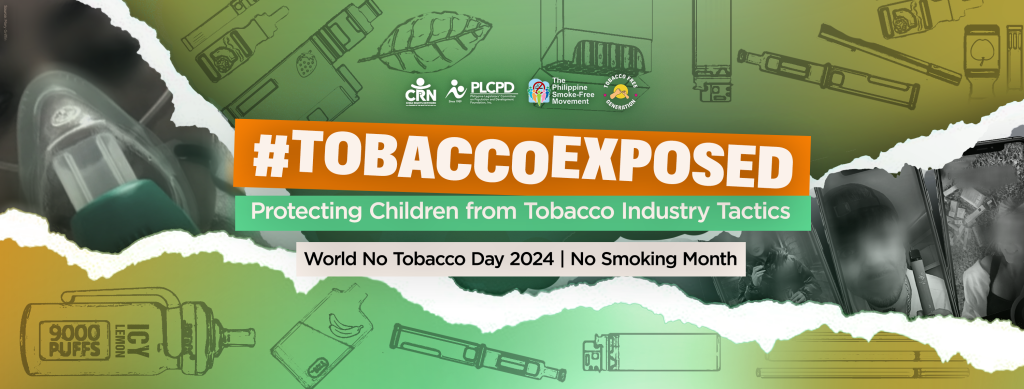Child rights advocates to Congress: Protect children from tobacco industry tactics

On World No Tobacco Day
Child rights advocates to Congress: Protect children from tobacco industry tactics
As the country commemorates World No Tobacco Day 2024, the Child Rights Network (CRN) calls on Congress to take a firm stand against the tobacco industry’s relentless and deceptive tactics targeting our children and youth.
This year’s theme, “Protecting children from tobacco industry interference,” highlights the need to protect our children from the unethical, manipulative, and even illegal practices of the tobacco industry.
“It has long been exposed that the tobacco industry sees children and teenagers as their future potential regular customers. They have targeted them before with their cigarettes, and they are doing it now with vapes and heated tobacco products,” said Mr. Rom Dongeto, CRN Convenor and Executive Director of the Philippine Legislators’ Committee on Population and Development.
The CRN Convenor explained that the industry is doing this very effectively by making false claims like “smoke-free,” “less harmful,” and “harm reduction,” while simultaneously peddling their alternative products that are just as harmful and addictive. They have also managed to circumvent traditional media advertising by partnering with social media influencers for stealth or even blatant advertising.
“They are creating an illusion that some cigarettes are more acceptable than others. Nothing can be farther from the truth. The rising cases of e-cigarette or vaping product use-associated lung injury or EVALI especially among young vape users dispute this claim. In fact, the Philippines has already recorded one death of a 22-year-old Filipino male, who has no comorbidities but is a daily vape user, due to acute lung injury and heart attack,” he said.
Mr. Roi Merca, a 23-year-old advocate for tobacco control from the Child Rights Network, said that vapes are far more attractive and can easily be marketed to appeal to the sensibilities of children and young people.
“From packaging to flavors to auxiliary products like lanyards, vaping has become a lifestyle and a trend among my generation. It’s easier to hide and smells significantly less or better than cigarettes. But it’s a wolf in sheep’s clothing. It contains nicotine, which is a highly addictive substance, heavy metals, and even formaldehyde which we all know is used in embalming,” he said.
“A lot of young people are struggling because they simply can’t stop vaping due to addiction and the tobacco industry is to blame for their false claims and interference in our policies which is making these products more attractive and accessible,” he added.
CRN noted that the tobacco industry’s aggressive and manipulative marketing tactics have contributed to a growing “vapedemic” among young people.
At least 37 million young people aged 13–15 years use tobacco in some form around the world, according to the World Health Organization. In the Philippines, the Global Youth Tobacco Survey reveals an alarming trend: 1 in 7 Filipinos aged 13 to 15 are already vape users, surpassing the same age bracket who smoke cigarettes.
‘Put back the child protection safeguards in legislation’
CRN noted that Congress should reflect today on how the industry-backed Republic Act No. 11900, the Vape Law, has only worsened the issue of teenage vaping.
CRN explained that the law has made vapes and heated tobacco products more accessible for younger people by reclassifying vapes as regular consumer products and transferring regulatory power to the Department of Trade and Industry (DTI). Regulation is even more challenging because the legal access age was reduced to 18 from 21, a wide array of flavors are allowed, and online sales are permitted.
“The law’s passage was actually a celebration for the tobacco industry, while it was a disaster for our children,” Mr. Dongeto said. “As a result, the protective measures in place are undermined, and youth nicotine addiction is allowed to flourish,” Mr. Dongeto said.
CRN called on Congress to enact immediate and decisive measures to reverse these harmful changes. Several measures were advocated by the group, including:





“The immediate steps we are advocating are extremely important to curbing the “vapedemic” and preventing a bigger health crisis in the future. During World No Tobacco Day, we urge Congress to avoid repeating history. It is not only a health issue, but a moral obligation to keep our children safe from the tobacco industry. We owe it to the next generation to ensure they grow up free from the harms of nicotine addiction,” Mr. Dongeto concluded. ###
